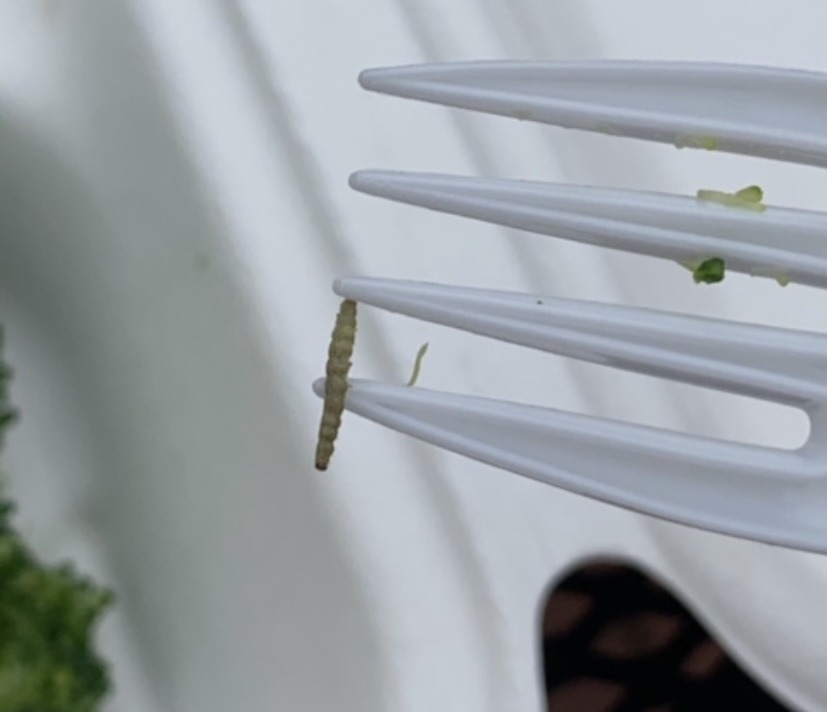Students receive unsafe food from campus dining
4 min read
Insect found in Maria Duque's broccoli. | Maria Duque
by TABITHA ROBINSON
Staff Writer
Some UMW students have experienced problems with on-campus dining since the return to campus for the fall 2020 semester.
Freshman Maria Duque found caterpillars in her broccoli in mid-September. Dunque tried to show pictures of the broccoli to the cashier. “She declined seeing my pictures,” said Duque. “So then I asked for the manager, but the manager wasn’t there…I showed the people who served the broccoli to me and they had no idea where it came from. They said to send them the pictures and they’d talk to the people who shipped the broccoli to us.”

Duque said of the staff, “I feel like they don’t want to be there, so they do their work sloppily.” She posted a picture of the broccoli to the University of Mary Washington Class of 2024 Facebook group. “I just wanted people to be aware and inspect their food,” said Duque. “Everybody was disgusted. We pay for this; it’s upsetting.”
Duque and other students are now buying groceries rather than eating at the dining hall. “I had to go to Giant and buy my own food because I didn’t want to risk it,” she said. “I’ve had five people go to Giant with me because they didn’t want to get food from the UC.”
According to Duque, her friends with allergies have ordered food that should be allergen-friendly only to find allergens, particularly at Hissho Sushi. In the first week of the semester, Duque also had undercooked chicken. “I cut into my chicken and it’s cold and pink. I didn’t say anything about that because I already knew a bunch of other people were posting about the raw chicken.”

Mika Bishton, a sophomore conservation biology major, ordered a burger on Oct. 11 from the Campus Grill dining hall station. “I just walked back to Eagle Landing, where I live, and then I opened it and split it in half and it was really, really pink. I don’t mind a pink burger, but it was red.” Bishton posted it on social media but did not inform any dining staff and does not blame them for the problem. “I probably should have reported it, but I thought it was a fluke,” said Bishton. “It’s not a big deal, it happens. I think the pandemic is stretching out workers. They’re probably trying their best—we all are.”
CJ Porter, who has been the UMW dining liaison for seven years, is in charge of addressing students’ concerns about on-campus dining.
“In March, it first became clear that we were in a global pandemic, and the emergency operations team began meeting. Before students even left in March, we immediately, overnight, changed how things were done in the dining hall,” said Porter. Students may order from retail outlets or the dining hall through the Grubhub app or by ordering takeout in person. Students have experienced a number of problems with this system.
The Grubhub app has also been a source of trouble for students. Students should have been able to order their food ahead for pickup, but this was not the case. Some retail locations were unavailable on the app for weeks, some had incomplete menus and the system was confusing. “Grubhub had never worked with a system like ours,” said Porter, referring to the combination of meal swipes and flex dollars that students use to pay for food. “It took them some time to get that figured out. We certainly did not have the opportunity to test Grubhub in the retail outlets until retail opened.”
“We do our best to respond to concerns,” said Porter. She posted a lengthy response to the dining issues on Facebook on Oct. 7. The response addressed the undercooked chicken, saying it was par cooked (partially cooked) and would be finished cooking right before it was served. “The chicken was simply one of several ingredients that were assembled and then “finished” (i.e. completely cooked) so that it could be freshly prepared at that station,” said Porter in the Facebook post. “With all fresh produce there is always a chance that small insects might be present. We contacted our produce supplier and they are tracing that broccoli back to the farm of origination in order to take appropriate actions on the supplier end,” she posted about the broccoli.
As for the hairs, Porter said everyone on the line has been re-trained with regards to hairnets and brushing their clothes. “We did reinforce our hygiene training with all employees and are continuing to monitor the situation,” she wrote in the post.
However, Porter said that the most common complaint from students was not related to the quality of food.
“The thing I am hearing the most often is not getting enough food,” said Porter. The dining hall adjusted their signage, so students are now encouraged to ask for larger portions and go back for seconds.
Despite the complaints from students, Porter has no concerns about the dining staff.
“I have the utmost respect for them,” said Porter. “They take a lot of pride in that food. They’re hoping to put out a food product that people like, and they feel really strongly about that. They get really upset when we bring these things to their attention!”
Porter had some final words of advice for the students. “If something is not right, tell somebody who can do something about it. I don’t like to find out about things on the [Facebook] meme page,” she said.


